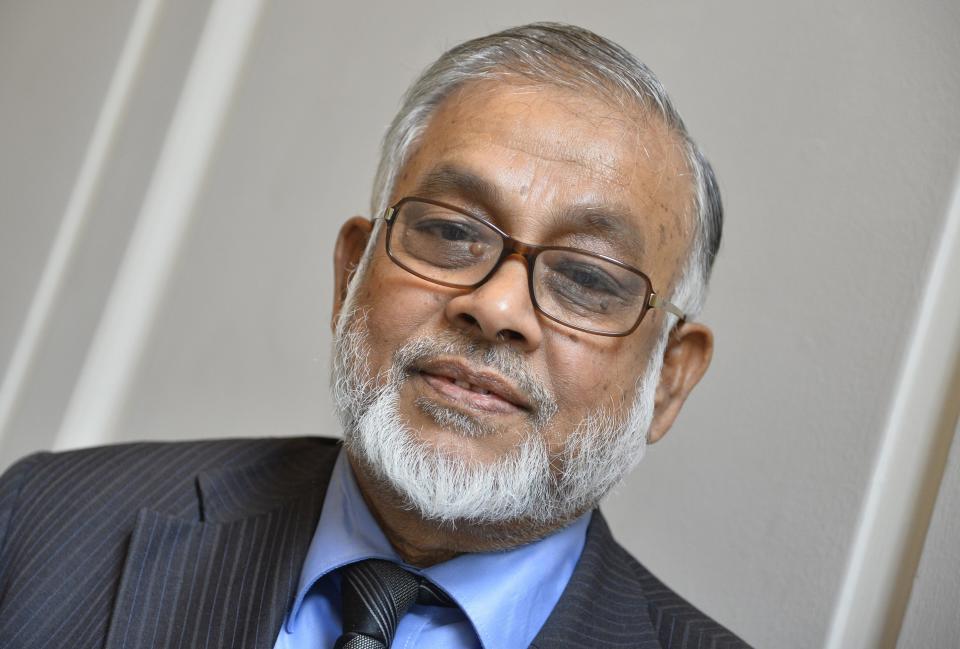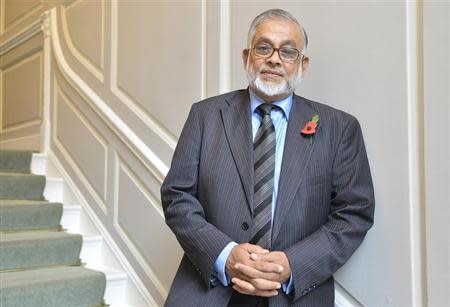British Muslim leader sentenced to death says Bangladesh trial 'farcical'
By Sarah Young LONDON (Reuters) - A British Muslim leader sentenced to death in his native Bangladesh for war crimes committed 40 years ago said the conviction was a politically motivated farce prompted by a vindictive government. Chowdhury Mueen Uddin was found guilty in absentia on Monday of the torture and murder of 18 intellectuals during Bangladesh's war of independence from Pakistan in 1971, during which 3 million people were killed. But in an interview with Reuters, Mueen said the convictions were totally unfounded, called the trial farcical and denied being involved in the violence. "If there is evidence so strong, why they were not brought against me earlier, nearer to the time?" the bespectacled 64-year-old told Reuters in the office of his London lawyer. "It is entirely politically motivated and actions from a vindictive government in Bangladesh." Bangladesh's government set up the war crimes tribunal in 2010 to investigate abuses during the 1971 conflict, angering the two biggest opposition parties, the Bangladesh Nationalist Party (BNP) and the Jamaat-e-Islami, who say the government is using the legal proceedings against them. In a 154-page judgment, the Bangladesh war crimes court said Mueen was in charge of operations of an al-Badr militia which opposed the independence struggle of what was then East Pakistan. The court said that in an attempt to cripple the Bengali nation's fight for independence, the group abducted intellectuals, killed them and threw them into mass graves. Mueen was sentenced to death by hanging. When asked directly whether he was involved in the violence, Mueen said: "I absolutely was critical of the military action. I never supported it. I supported the unity of the country, but that was a political support, nothing to do with military action or atrocities." PROTESTS The war crimes convictions have prompted a wave of violent protests in Bangladesh, presenting the government with a security challenge ahead of polls early next year. The New York-based Human Rights Watch group has said the tribunal's procedures fall short of international standards and on Wednesday the U.N. High Commissioner for Human Rights also expressed concern about the conduct of the war crimes tribunal. Since settling in Britain in 1972, Mueen has worked for religious organizations. He said he arrived in London on an employment visa after allegations were made against him in the aftermath of Bangladesh independence. "Someone wrote a piece against me and that became almost viral around the media. After that, the family thought it would be foolish to try to stay there in the madness that started after the liberation," he said. Living with a death sentence hanging over him felt like a nightmare, he said: "The whole world fell apart. It is a huge mental and psychological pressure on me and my family." Mueen said he had not been contacted by the legal authorities in Bangladesh at any time about attending the trial. "They have continued this trial without even approaching us in any shape or form." Now a British citizen, Mueen said he had travelled to Bangladesh frequently over the last 40 years without any difficulty. Bangladesh has so far not requested Mueen's extradition, said his lawyer, Toby Cadman. He said there was little prospect of Britain agreeing anyway, given its opposition to the death penalty and its concerns about human rights in Bangladesh. "If there is an internationally accepted trial process under international supervision, and not as biased and farcical as the one in Dhaka, then we have absolutely no problem in presenting ourselves to such a trial," Mueen said. (Editing by Guy Faulconbridge and Angus MacSwan)


